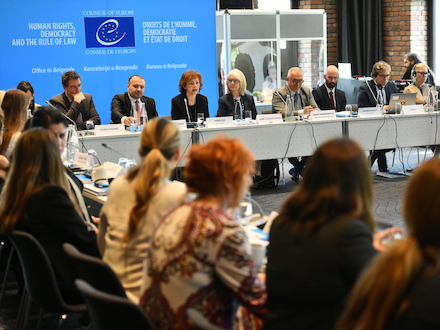The fight against money laundering, corruption, and organized crime remains one of the most important priorities for Serbia due to its negative impact on the rule of law and the country's economic development. The Council of Europe is committed to providing continuous support to Serbia's state authorities in order to consistently and sustainably improve key mechanisms for preventing and combating money laundering and corruption. This support relies on strong cooperation with state institutions and civil society, and the Council of Europe will continue to assist the Republic of Serbia in enhancing policies in accordance with European and international standards.
These are the main conclusions of the conference held on May 29, 2024, in Belgrade, which marked the completion of the four-year project "Preventing Money Laundering and Terrorist Financing in Serbia" and the launch of a new phase of support through the project "Countering Economic Crime in Serbia".
Nadia Cuk, Deputy Head of the Council of Europe Mission in Belgrade, highlighted the importance of the Council of Europe's cooperation with Serbia in combating economic crime in her opening speech. She emphasized the erosive effect of money laundering, corruption, and related crime on democracy and democratic institutions. Ms. Cuk reaffirmed the Council of Europe's commitment to continuing to assist Serbian authorities in preparing for the sixth round of Moneyval evaluations and in meeting the GRECO recommendations from the fifth evaluation round for Serbia.
Anna-Charlotte Malm, Head of the Development Cooperation Department at the Swedish Embassy, the country that financed the project in Serbia, emphasized: "The overall goal of Swedish development cooperation is to create better living conditions for people living in poverty and oppression. There is a clear connection between money laundering, organized crime, and the distribution of resources, balance of power, and human security. The project 'Preventing Money Laundering and Terrorist Financing in Serbia' is one of Sweden's leading initiatives in the area of the rule of law."
The event was organized within the framework of the Council of Europe's projects "Preventing Money Laundering and Terrorist Financing in Serbia" and "Countering Economic Crime in Serbia," funded by the Swedish International Development Cooperation Agency. The goal is to support Serbia in addressing systemic deficiencies in preventing money laundering and terrorist financing. The project steering committee, which includes representatives from the Securities Commission, adopted the report on the previous project and the work plan for the new project for the next four years.

